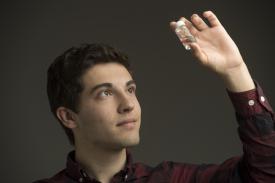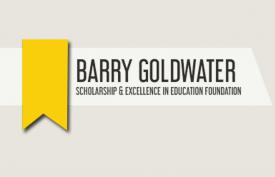Maine Christos, Nicholas Page are expanding knowledge through science
Nicholas Page has high ambitions; his goal is to develop the first drug-based treatment for autism. Maine Christos is pushing the boundaries of human knowledge by analyzing data from the Large Hadron Collider (LHC).
The two students at Rutgers University–New Brunswick’s School of Arts and Sciences are among 211 selected nationwide as Goldwater Scholars for the 2018-19 academic year, the top undergraduate award of its kind in the natural sciences, engineering and mathematics. An additional 281 nominees, including Rutgers junior Lawrence Gardner, a mechanical engineering major, earned honorable mentions.
“Maine and Nick show what can be accomplished with determination, curiosity and the mentoring and resources available to our students at Rutgers University–New Brunswick,” Chancellor Deba Dutta said. “The Goldwater Scholarship will push them to new heights of success, and highlight the excellence of a Rutgers education.”
“Maine was the top choice of our Goldwater Scholarship nominating committee, convinced as all of us were that she has an extremely bright future as a researcher at the bench doing computationally-intensive physics, “ said Arthur D. Casciato of Undergraduate Academic Affairs at Rutgers–New Brunswick. “In Nick’s case, though we rarely nominate sophomores, our committee felt he deserved our support because of his commitment to using state-of-the-art biological methods and bioinformatics tools to answer research questions concerning autism.”
Page, of Matawan, New Jersey, is a sophomore cell biology and neuroscience major and a student in the Rutgers–New Brunswick Honors College. It is unusual for a sophomore to be selected as a Goldwater Scholar, but Page gave himself an early start in scientific research.
As a high school sophomore he competed in Rutgers’ Brain Bee, a neuroscience trivia competition hosted by Robert Wood Johnson Medical School – and used the opportunity to ask Mladen-Roko Rasin, an associate professor of neuroscience and cell biology at the medical school, for the chance to volunteer in his lab. The work he did while still in high school propelled Page to attend Rutgers and complete independent lab work, under Rasin’s guidance, as a freshman.
Page’s current research is on the formation of the cerebral cortex, which he hopes "will provide insights into future treatments for disorders related to the formation of the brain such as autism, epilepsy and schizophrenia.”
Christos, from Ringwood, New Jersey, is a junior physics and math major. Under her academic advisor, Sunil Somalwar, a professor in the Department of Physics and Astronomy, she is working on a physics student’s dream: analyzing data from the LHC, specifically its Compact Muon Solenoid (CMS) detector.
Her focus is on using machine learning, in which computer systems separate useful information from “background” in large sets of data, to more efficiently look for new particles that may emerge when protons collide with each other at high speeds. Christos’steam is specifically looking for a set of particles that, if discovered, would expand on the Standard Model of particle physics.
But she noted that, even if those particles are not found, “We’re seeing an improvement in our ability to recognize signal from background that we believe is significant and can be applied to other searches,” particularly in the field of high energy experimental physics.
“The Goldwater Scholarship carries a lot of weight, especially for a physics major and someone who wants to go to grad school in this field. Seeing all of the people from Rutgers University who were awarded this scholarship in the past means a lot to me,” Christos said.
The scholarships include up to $7,500 a year for tuition, fees, books and room and board for up to two years. Endowed by the federal government, the Goldwater Scholarship honors the late U.S. Senator.
This year’s selection of two Goldwater Scholars from Rutgers–New Brunswick is significant. The Barry Goldwater Scholarship and Excellence in Education Foundation selected fewer scholars nationwide this year, and the number of participating schools and students has increased, with 455 institutions nominating 1,280 students. Of the 44 students that Rutgers–New Brunswick has nominated since its Office of Distinguished Fellowships was established 11 years ago, 23 have been chosen as Goldwater Scholars.
FULL SOURCE: Rutgers Today | Two Rutgers Students Honored With Goldwater Scholarships


